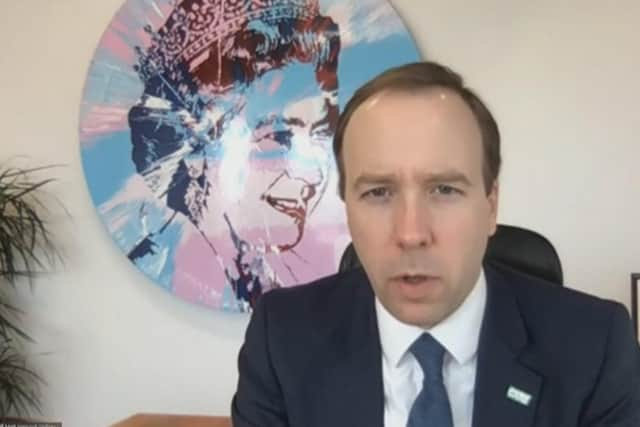Matt Hancock rushes to meet 100,000 coronavirus tests target
All key workers in England would now be able to get a test if they or their employers request one, UK Health Secretary Matt Hancock announced as he said widespread testing and tracing of those coming into contact with confirmed cases was the only way to ease social distancing measures.
The list includes NHS and social care workers, police officers, teachers, social workers, those in the justice system, undertakers, some in local government, supermarket and food production workers, journalists, transport workers and some people in utilities and IT.
Advertisement
Hide AdAdvertisement
Hide AdIt also includes workers in the oil and gas sector, which is concentrated in northeast Scotland, but workers north of the border will have to wait and see if the Scottish Government follows suit.


Last night a spokesman for the Scottish Government said it was looking to expand eligibility and would keep criteria under review.
From today, those seeking a test will be able to register for one via a government website, with Mr Hancock pledging “easier, faster and simpler” testing. Companies will also be able to book them for employees.
People who register will receive a text or email with an appointment at one of 48 drive-through centres or can request a home test kit, although the latter are currently in limited supply.
A help desk has been established to aid the process, while 48 mobile units run by the army will travel around the country to where they are needed, such as care homes.
An army of 18,000 people, including 3,000 clinicians, will also be recruited to work on contact tracing, supporting an NHS mobile phone app that will automatically log users’ contacts and warn them if they have been close to someone who tests positive.
It follows criticism of the failure to significantly increase the number of tests, with the latest daily figure of 23,000 still less than half the total testing capacity, which has risen to 51,000. Labour leader Sir Keir Starmer has said drive-through testing centres are a “bad policy” because many health and care workers live too far away, or do not own a car.
Health officials insisted the government was ahead of its plan to increase testing. Mr Hancock said: “Because capacity has now increased so substantially, we are now able to expand who can get the tests.
Advertisement
Hide AdAdvertisement
Hide Ad“Our ultimate goal is that everyone who could benefit from a test gets a test.”
The Health Secretary said it was “all part of getting Britain back on her feet” and he also urged people invited to take part in a coronavirus testing study, telling them: “You will be doing your bit.”
Around 25,000 people will take part in the first phase of the study to measure the spread of the illness, with plans to expand it to up to 300,000 over the next 12 months.
Mr Hancock said: “Letters are arriving on doorsteps from today, please, if you’re asked, take part in this vital research for your country. The early signs from today are that there is huge enthusiasm from those who’ve received letters taking part in this survey.
“If you get a letter please respond to it as soon as you can because you will be doing your bit.”
For the study, initial findings from which are expected in early May, all participants will provide a nose and throat swab to test whether or not they currently have the virus.
Adults in some 1,000 of the households will provide a blood sample to find out what proportion of the population has developed antibodies to Covid-19.
Mr Hancock said the study will be drawing on the household survey experience of the Office for National Statistics (ONS) and the scientific expertise of Oxford University.
Advertisement
Hide AdAdvertisement
Hide AdParticipants will form a representative sample of the UK population by age and geography.
Those selected will provide samples taken from self-administered nose and throat swabs and answer a few short questions during a home visit by a trained healthcare professional.
Participants will be asked to take further tests every week for the first five weeks, then every month for a year.
Mr Hancock said the study would provide “critical” information to support the battle against the virus and represented “one of the biggest virus infection and antibodies studies that this country has ever seen”.
He added: “We will use these tests to help us strengthen our scientific understanding and inform us on the big choices that we have to make about social distancing measures and how we start returning to a more normal life.”
Labour’s shadow health secretary Jonathan Ashworth said workers had to be able to access the tests being offered to them.
“It is welcome ministers now recognise the importance of testing and tracing,” Mr Ashworth said. “It is crucial that greater numbers of critical workers such as care staff are now able to access testing.”
Comments
Want to join the conversation? Please or to comment on this article.